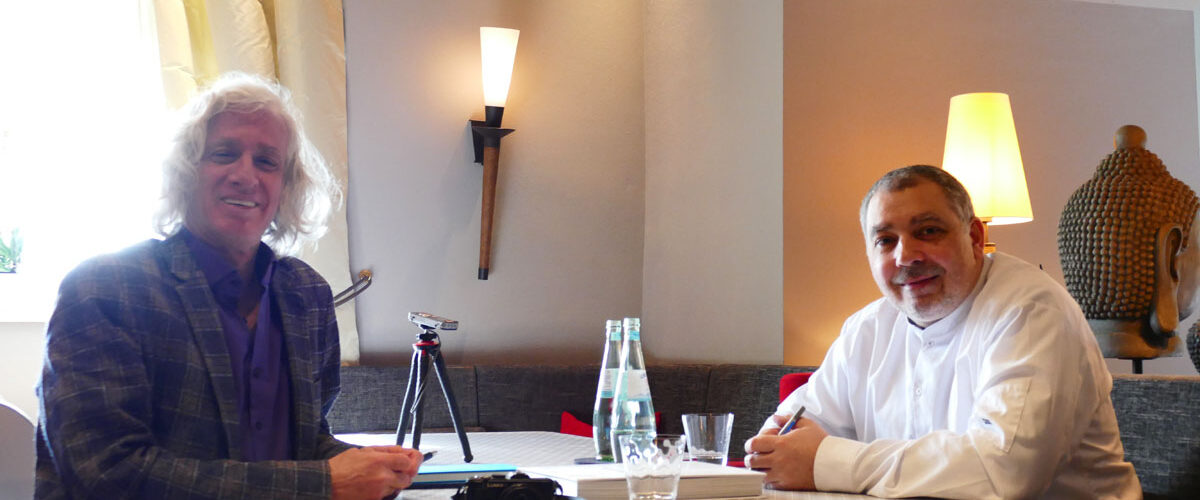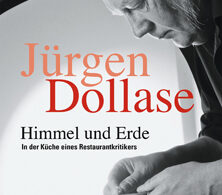MG: Are you religious?
I was educated like that, very strict religious, a Catholic family, I was an acolyte.
My grandparents lived right next to the church, that’s where my parents’ house is.
Yes, I do believe in something, but I don’t have to go to church every Sunday. The last decade of the Catholic Church was bad, child abuse, homophobia, just to name a few examples. I don’t understand the Church anymore.
We are moving closer together globally, we are open to the world, the Catholic Church is no longer up to date.
I don’t believe that the priest without celibacy is the worse priest.
At first, people were happy when Pope Benedict was elected a few years ago. But he didn’t change anything, he didn’t open up, he didn’t withdraw financially, all that doesn’t speak for the Catholic Church.
At some moments, I am very tired, I find power in a faith that has nothing to do with the Church.
MG: Do you read reviews?
CB: Of course I read reviews. When you’re a young chef, bad reviews really affect you, you can’t sleep, you react very emotionally to them.
Today you know how to assess it better, I know all sides of the business, you know its strengths and its weaknesses.
You think about reviews, whether they are positive or negative.
I can’t do anything with hymns, I don’t have to read for the fiftieth time, that I have the freshest and best tuna.
This has nothing to do with arrogance, but with a relaxed attitude and experience of life.
You have to know how to evaluate yourself, where to position yourself. You know your staff and you know how to assess them. Criticism must be perceived and taken seriously.
Recently, a guest complained about something. At first, I rejected it.
After I slept on it for a night, I called the guest and told him that his perception coincided with my own, you have to admit something like that. In principle, this criticism was a help. To realise that, you need self-reflection. You must not think that you are doing everything right.
MG: Only a handful of chefs have mastered the art of cooking a sauce of technical and aromatic perfection; individuality suffers as a result, much of it is being standardised, comes from a bag or from the freezer compartment.
You had the privilege of learning at Gutbert Fallert’s “Talmühle”, among other places, where they know how to prepare excellent sauces according to Escoffier or Carême.
Do you think that people have forgotten the “art of the sauce”, on the one hand because of the time constraints, and on the other hand because there are only a few chefs left who pass on the knowledge about it?
CB: We work in a “chef community” where everything is handled very openly. Colleagues rarely keep secrets to themselves, you can read everything in the books, my staff know exactly how I prepare the courses.
But it has to be said that the younger generation learned the craft differently than I did at my time.
The spiral is going down, there is neither time nor staff. Some businesses don’t quite handle the economic side, then they rationalise, resort to convenience, or simplify cooking too much.
I enjoy the privilege of working in a company that provides me with all these resources, including nine qualified chefs.
Of course, I pay a lot of attention to the preparation of the sauces, to excellent products, but I can also afford it here.
We buy whole animals for the restaurant, whole guinea hens, whole fish, etc., everything is used, carcasses, offal, legs, simply everything. You have to have mastered the craft, I’m happy to pass that on. Unfortunately, many others don’t have the opportunity because there are not enough staff there, sometimes the business background is missing.
Decontextualisation, irony, spectacle and performance are perfectly legal as long as they are not superficial, but respond to or connect with a gastronomic reflection.
Ferran Adrià
MG: An intellectual concept has to go through a metamorphosis to trigger feelings within the recipient. Do you have a method by which you shape thoughts into feelings??
CB: I look at it from an overall perspective. Every employee who starts with us learns about our two credos at the job assessment interview:
- Do things with passion or not at all
- With our work we want to make people happy
The first credo points to the craft, do it right or leave it! We have a high quality ethos. You can’t make good things out of bad things, but on the other hand you can make very bad things out of good things without the right craftsmanship.
The second credo, of course, refers especially to the service staff. However, it is not about specific procedures or some general mumbo-jumbo.
The whole thing has to be right, from the reservation with a proper confirmation letter to the welcome in the restaurant. We want to create a warm, personal, almost family atmosphere right from the start.
In addition to the good food, a service atmosphere must be cultivated that is not overcrowded, and of course the rules must be observed.
From the very first minute, the guest should feel comfortable with us. Creativity certainly plays a role here, but for me, the totality takes precedence.
![[:de]Grandgourmand, Travel, Food, Lifestyle[:]](https://grandgourmand.de/wp-content/uploads/2023/01/logo_23_1-1.png)




